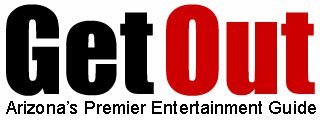|

Nashville offers up kinder, gentler outlaws
By CHRIS HANSEN ORF
GET OUT
Waylon Jennings was a trailblazer. Sick of being under the thumb of Nashville and its long-standing credo that singers get absolutely no artistic control, Jennings left the home of the Grand Ole Opry in the early ’70s, hooked up with another ex-Nashville bad-ass, Willie Nelson, in Austin, Texas, performed for cowboys, bikers and hippies, then moved back to Nashville and demanded unprecedented artistic control.
And he got it.
When his 1973 album “Honky Tonk Heroes” hit shelves, Nashville labeled Jennings an “outlaw,” and a new Music City movement was manufactured. As Waylon himself once sang, “Someone called us outlaws in some old magazine.”
Jennings was never a fan of labels, and saw the outlaw tag as a way to commercialize his music. “I don't even really know what ‘outlaw country’ is supposed to mean,” says Tempe's Roger Clyne, whose twangy rock ’n’ roll band Roger Clyne & The Peacemakers has skirted major labels, preferring to do things their own way with their own record label. “Once you try to define (a movement), you sully it. If you don't know it when you hear it, you can't tell anybody what it is.”
NEW ‘OUTLAW COUNTRY’
Now, Nashville is telling country fans what the new “outlaw country” is.
In 2004, The Muzik Mafia rose up out of Nashville's lower Broadway clubs to stun Music City CEOs with the dual success of Mafia members Gretchen Wilson and duo Big & Rich, all of whom struggled to fit in with the industry's cookie-cutter machinations. Wilson was hard-core honky-tonker, and Big & Rich fused hard rock, honky-tonk and even hip-hop into their music.
They did it their way, and Nashville suits were quick to label the Muzik Mafia and older acts like Montgomery Gentry, who add a healthy dose of Southern rock into their country, as Nashville's new outlaw movement.
“This is exactly the same as it was when Willie, Waylon, Jessi (Colter) and Tompall (Glaser) released ‘Wanted: The Outlaws,’” says Valley-based country singer Dave Insley of the success of the new outlaws.
“Certainly nobody in Nashville expected that record to top radio and sales charts, but they were all quick to step in to take the credit for an album that was created completely outside of their system.”
REAL TRAILBLAZERS?
While Jennings, Nelson, David Allan Coe and Johnny Paycheck looked like they'd just as soon kick your ass as shake hands, today's outlaws look like they spend more time getting their hair highlighted in the salon than trading punches in the local honky-tonk like their distant musical cousins.
The question begs: Despite what Music City is selling — and that's not to say that the music is bad — are these artists real trailblazing outlaws?
“I hate to be critical,” Clyne says of the new “outlaw country” acts. “But I'll tell you what I do think: I think it's sort of like when you go into a Mervyn's and buy a pair of punk rock pants — it feels manufactured. It feels to me like it takes some of its soul away from it, takes some of the feeling out.”
“If Montgomery Gentry and Big & Rich is ‘outlaw country,’ then I'll eat my sombrero,” says Valley based country singer Dave Insley, whose brilliant debut disc “Call Me Lonesome” made a big dent on the Americana charts this year. “This is just another case of the music industry machine trying to co-op anything that comes along — that looks like a trend — and trying to homogenize and package a watered-down version of it, to shove it down everybody's throat.”
OUT OF LIMELIGHT
So if Montgomery Gentry and Big & Rich aren't outlaws, who are the real outlaws of country music these days?
“The real outlaws are still out there, still bucking the system to get their records made and are still largely ignored by the mainstream media,” Insley says. “The only time a James Intveld or Jesse Dayton gets any love from Nashville is when they succeed in spite of the complete lack of support from the industry.
“The sad thing is, there are some fabulous artists out there doing this kind of music that are largely unknown,” Insley says of non-Nashville country artists. “Most of the time when they come to Phoenix, they play to empty chairs.”
The Original Outlaws
Merle Haggard
(1937 -)
Outlaw History: Haggard is regarded as the best country singer songwriter of the 1960s, eschewing Nashville trends to live and record his hardscrabble, twangy honky-tonk in Bakersfield, California.
Outlaw track:“I'm a Lonesome Fugitive” (1967), with the lines “I raised a lot of cane back in my younger days while Mama used to pray my crops would fail/ I'm a hunted fugitive with just two ways: Outrun the law or spend my life in jail.”
Outlaw moment: Merle spent some time in stir in California's San Quentin Prison in the early ’60s for a bungled robbery: Drunk, he tried to break through the back door of a bar while the joint was still open.
Waylon Jennings
(1937-2002)
Outlaw History: Jennings plied his trade with moderate success in the ’60s, taking orders from label heads and producers and scoring a few hits. Fed up with Nashville, Waylon moved to Austin and got huge down there with Willie Nelson. Upon his return to Music City, Jennings was given a Music City first: Full artistic control.
Outlaw track: “Cedartown, Georgia” (1971) A classic murder ballad, Jennings’ baritone delivers the lines “Tonight I’ll put her on a train for Georgia/ Gonna be a lotta kin folks squallin’ and a grieving/ ’Cause that Cedartown gal ain’t breathing” with icy finality. Outlaw moment: Jennings had developed a $1,500 a day cocaine habit by the late 1970s and in 1977 was busted by the FBI during a recording session, which he later sang about in “Don't You Think This Outlaw Bit's Done Got Out of Hand” in 1978.
Willie Nelson
(1933 - )
Outlaw History: A successful Nashville songwriter in the late ’50s and early ’60s (among other great tunes, he wrote “Crazy’ for Patsy Cline and “Hello Walls” for Faron Young), Nelson gave up trying to break through to performer status and moved back to his home state of Texas, grew a beard and a long ponytail, got reacquainted with Waylon Jennings and the rest is outlaw country history.
Outlaw track: “Me and Paul” (1971) Willie got busted for pot often in the old days (and as recently as ’95), and his scrapes with Johnny Law may have contributed to the lyrics “Almost busted in Laredo, but for reasons that I'd rather not disclose/ But if you're stayin' in a motel there and leave/ just don't leave nothin' in your clothes.”
Outlaw moment: Sure, Willie's had his share of pot busts and problems with the IRS, but his greatest outlaw moment, if true (it obviously cannot be confirmed), is as “outlaw” as it gets: Legend has it that Nelson blew some yerba on the roof of the White House during the Carter presidency.
David Allan Coe
(1939 - )
Outlaw History: Coe got his break in Nashville in the early 1970s when he was living in a hearse parked right in front of the Ryman Auditorium (which was home to the Grand Ole Opry) and wore outlandish garb onstage, calling himself the “Masked Rhinestone Cowboy” (Coe's early escapades were later immortalized by Glen Campbell in his 1974 hit “Rhinestone Cowboy”).
Outlaw track: In “If That Ain't Country” Coe narrates in his gritty twang “Tryin' like the devil to find the Lord, workin' like a demon for my room and board/ A coal burnin' stove, no natural gas, and if that ain't country/ I'll kick your ass.” And he'd kick it too.
Outlaw moment: It's hard to pick a singular moment out of a life that includes being sent to a reformatory at age 9, doing hard time in prison (which allegedly included a stint on death row for killing an inmate who tried to get... uh...cozy with him) and is covered with some serious tattoos (and reportedly has a tattoo of a spider on his genitals). This guys' whole life had been an outlaw moment.
Johnny Paycheck
(1938-2003)
Outlaw History: After some marginal success on the charts in the 1960s with some hard-core honky-tonk, Paycheck (nee Donald Eugene Lytle) was a living drunk on the streets of L.A. before having his biggest success in the 1970s, most notably with the David Allan Coe-penned smash “Take This Job and Shove It.”
Outlaw track: Paycheck grits his way through the lines “I'm thinkin’ ’bout crankin’ my ragged old truck up and haulin’ myself into town/ I'm thinkin’ ’bout raisin’ so much hell, I'm gonna have to die before I live it all down” on Billy Joe Shaver's “Ragged Old Truck,” a swampy honky-tonk classic.
Outlaw moment: In 1985 Paycheck was drinking in a bar in Ohio when we got into a scuffle with another drinker, which he ended by shooting the dude, and Paycheck spent several years in the hoosegow. Paycheck died in 2003, but he still hasn't lived that one down.
NEW CLASS OF OUTLAWS
Hank Williams III
A pure honky-tonker, Williams is the grandson of the greatest country singer of all time (Hank Sr., a bad-ass who got kicked off the Grand Ole Opry for poor behavior) and the son of an original ’70s outlaw (Hank Jr.), so it comes as no surprise that Hank III has made a few great country records, ticked off his label, Curb, with his non-mainstream ideas, and is now known to proudly wear “(Expletive) Curb” T-shirts onstage.
Check out: ‘‘Lovesick, Broke & Driftin’ ’’ (2002)
Shooter Jennings
With a pure outlaw pedigree (dad is the late, great Waylon Jennings, mom is Jessi Colter), Shooter was born to do things his own way and his debut disc is full of the Jennings ’tude. Like Williams III, Shooter is getting his shot in Nashville due to name recognition (his “4th of July” is a surprise country hit”), but how long before his feisty genes get under Nashville's skin?
Check out: ‘‘Put the ‘O’ Back in Country’’ (2005)
Dale Watson
Watson is so good, it's a crime his pure country is not being consumed by the masses, but the Texan refuses to cave in to mainstream pressure, and his tune “Nashville Rash” is a scathing reprisal of current Music City machinations.
Check out: ‘‘Cheatin' Heart Attack’’ (1995)
Jesse Dayton
Texan Dayton was born 40 years too late, as his twang would have been perfect for a jukebox in a dusty honky-tonk circa 1965.
Check out: ‘‘Hey Nashvegas’’ (2001)
Bastard Sons of Johnny Cash
With a name like that (Mr. Cash gave the band his blessing) you'd better be tough, and San Diego's Mark Stuart and the other Bastards play timeless honky-tonk with an rough and ready attitude.
Check out: ‘‘Mile Markers’’ (2005)
Charlie Robison
Robison, who has barely scraped the country charts in his attempt to play Music City's game, once wrote on his Web site: “As for Nashville, (expletive) Nashville! I am number one on their (expletive)-list.” Talk about biting the hand that feeds. Incidentally, Robison is the husband of Emily Robison of the Dixie Chicks, a group also on the outs in Music City due to their political posturing.
Check out: ‘Life of the Party’’ (1998).
|




